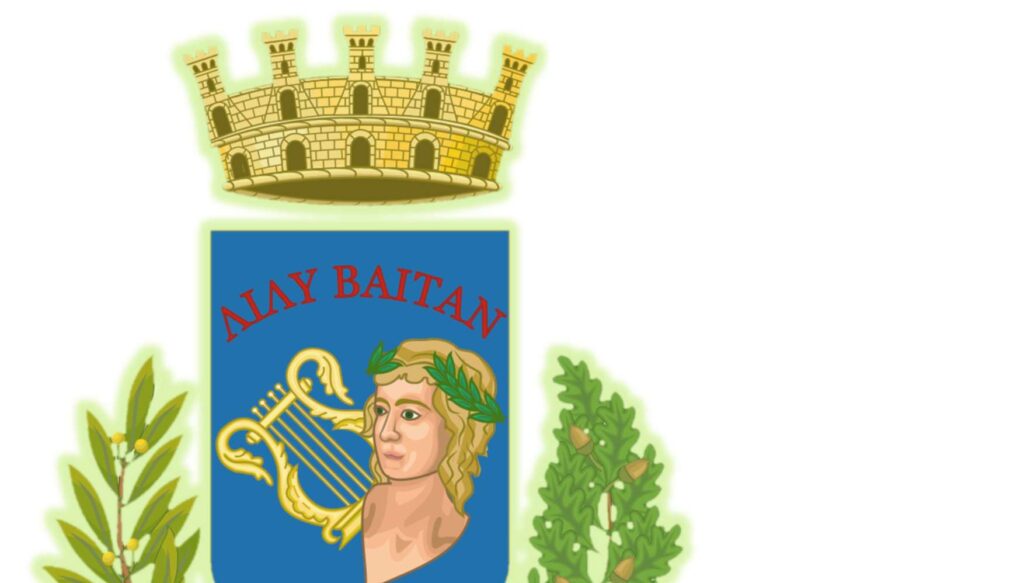

CHAPTER 1: Enhancement of human resources – the reform never implemented in Marsala.
CHAPTER 2: Reuniting Marsala – Bringing the suburbs to the center.
CHAPTER 3: Return of talents – Marsala calls its children back from around the world.
CHAPTER 4: Efficient public services: from emergency measures to normality.
CHAPTER 5: A city at the service of the least – overcoming all barriers.
CHAPTER 6: Marsala Zero Waste – An achievable goal.
CHAPTER 7: Marsala Autonomous Energy – Zero Emissions Municipality by 2031.
CHAPTER 8: Marsala, a DI-VINE place – agriculture at the heart of new development.
CHAPTER 9: Marsala tourist city – open doors to the world, roots in the land.
CHAPTER 10: Marsala is thirsty – a strategic plan for water, a common good and vital resource.
CHAPTER 11: Associationism and Enhancement of Social and Sports Spaces
CHAPTER 12: Management of Cultural Facilities – Towards a Foundation for Marsala
CHAPTER 13: Guaranteeing every citizen of Marsala a safe and peaceful environment.
CHAPTER 14: Development and Management of Parking Facilities and Connectivity Infrastructure
CHAPTER 15: Political Program for the Historic Center of Marsala.
Marsala: the city that dreams again.
There are moments in the history of a city when it is necessary to stop.
Looking inward.
Ask ourselves: where are we going? Who do we want to be?
Marsala today is at a crossroads.
For too long this city, which has been the birthplace of extraordinary men and women, seems to have
misplaced direction. A land rich in history, culture, intelligence and beauty, which risks every
day of resigning oneself to mediocrity, to the grayness of neglect, to the short step of a policy without
respite.
Yet, Marsala is so much more.
Marsala is the light reflecting off the salt pans at sunset.
It is the wind that tells stories among the rows of cricket.
It is the memory of a land that made Italy, and the future of those who have the courage to stay.
It is the talent of those who left and carried the name of this city far, and now decide to return for
Giving back everything he learned.
This is where the candidacy of Leonardo Curatolo to Mayor of Marsala.
Leonardo is one of the many sons of this land. He grew up among the desks of Marsala schools, has
walked these streets, breathed this light. Then he took flight, carrying his
expertise and his ingenuity around Italy and the world. He has directed projects, faced challenges
complex, built international relationships, always with one fixed thought: his city.
Today he chose to return. Not out of nostalgia, but out of responsibility.
Not to begin again, but to give back.
Because those who left and were successful elsewhere, if they return with humility and vision, they can be the spark
Of genuine change.
The program you have in your hands is the result of this history.
It was built by listening to those who live and work here every day: farmers, teachers, young people,
entrepreneurs, seniors, students, social workers, artists, merchants. It is a program that unites
dream and concreteness. That looks far, but starts close.
It is not a book of promises: it is a compass.
This is not a campaign: it is a pact with the city.
We want a Marsala that rises up and reignites.
A green, fair, young Marsala.
A city where children can grow up peaceful, young people choose to stay, the elderly be
respected.
A city that believes in smart tourism, innovative agriculture, culture as an asset
common, in sports as social redemption, in work as dignity.
A city that trusts science, that invests in education, that cherishes the landscape, that
Leaves no one behind.
Leonardo Curatolo does not promise miracles. He promises commitment, vision, transparency.
He promises to lead Marsala as a son leads his parents' house: with care, with
Gratitude, with love.
Because Marsala doesn't just need to be administered. Marsala needs to be
Thought about, listened to, respected.
Most importantly: beloved.
This program is an invitation. To dream together. To build together. To believe again,
all.

To truly improve the performance of the
administrative machine, it is essential to put at the
center the people who work in the municipality. There is no
can achieve efficient, innovative and
close to citizens without serious investment and
Structural on human resources: motivated employees,
trained, enabled to work well and
with clear objectives are the key to a
deep change.
Unfortunately, Marsala has suffered for years from the absence of
A real policy of personnel enhancement
municipal. The choices were often dictated by.
client logics or by bureaucratic management
Devoid of vision. It was preferred to ignore the
internal potential, not recognizing the merits, not
investing in training and not activating tools of
growth and empowerment.
OUR PROPOSAL
To reverse this course and unleash the best energies of the Authority, we propose a participatory path, to be implemented in tune with labor organizations, based on transparency, equity and results:
A modern public administration starts with people
A municipality that invests in its staff is a municipality that builds efficiency, service quality and citizen trust. Without enhancing human capital, every plan will remain on paper. It is time for Marsala, too, to have a real personnel policy that is modern, fair, participatory and results-oriented
Marsala is not just an urban center: it is a city-territory. Half of its inhabitants live outside the
downtown, along an axis of districts that are
extends from Birgi to Strasatti, passing through Paolini,
Ciancio, Terrenove, Dammusello, St. Anna and
dozens of other realities.
It is time to patch up Marsala.
This requires a new policy, careful and
constant, which gives dignity to suburban neighborhoods, often
forgotten, without services, without public spaces, without
transportation and with bad roads.

1. The Suburbs and Contradictions Department is born.
An alderman with exclusive delegated authority, dealing with:
2. A Multi-Year Plan for the Contrade.
The municipality will adopt a Periphery Plan With annual priorities:
3. Suburbs as a social laboratory
The quarters are not just areas to "repair," but places to experiment:
The districts at the center of the new Marsala
A new pact between city and country, between center and suburbs. A municipality that does not leave behind
none and that values its territorial specificities as an asset and not a hindrance.
FOREWORD
Marsala, like much of Southern Italy, has seen
generations of bright young people leave the city in
seeking professional opportunities, study and
personal growth elsewhere: in large Italian cities, in
Europe, in the world. Today, many of these young people -
become professionals, researchers, entrepreneurs,
artists - are invaluable assets that can be
made available to their hometown. Not
it is only about attracting physical returns, but also about
build networks, projects and
Relationships that allow Marsala to rethink its future. With those who know and love her, even from afar.
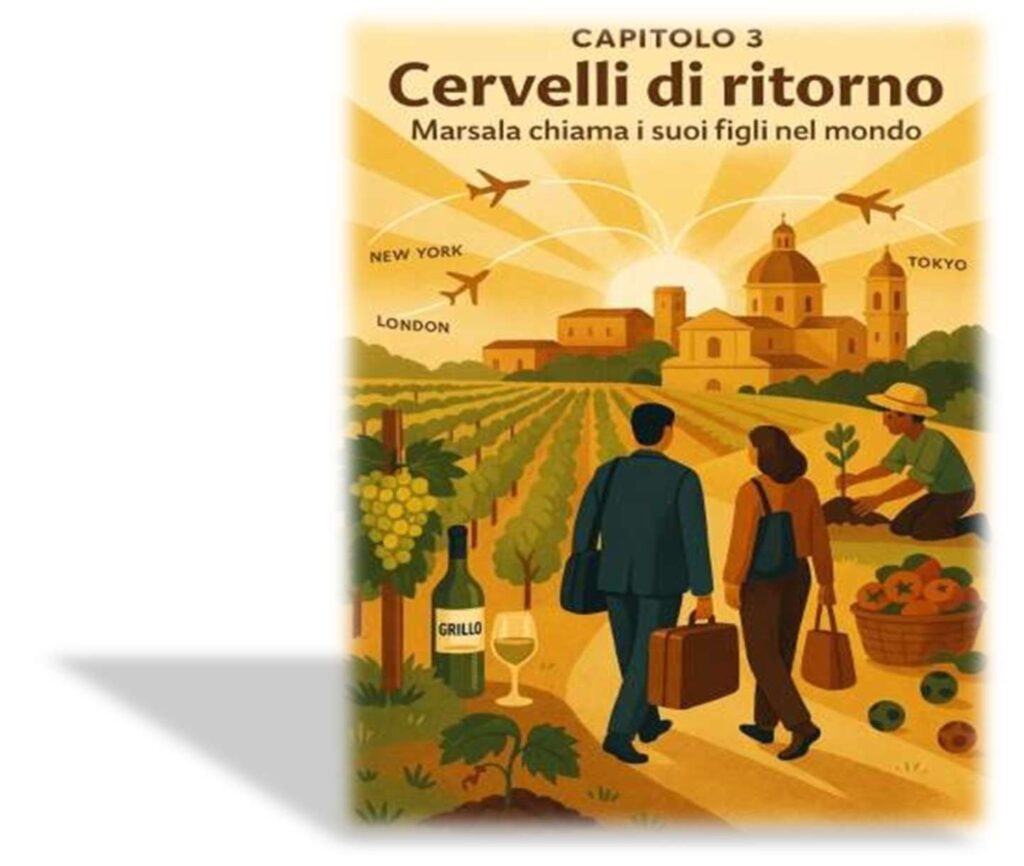
Goals
Operational proposals
1. Registry of Marsalese in the World
Creation of a digital portal to collect the contacts and professional profiles of Marsala residents abroad or outside the region, with the aim of facilitating dialogue, exchange of skills and participation in territorial projects.
2. Annual Day of Marsalese in the World
A day dedicated to bringing together those who live in Marsala and those who have left, with panel discussions, testimonies, presentation of projects and opportunities for collaboration.
3. "Marsala is waiting for you" program.
Incentives for the temporary or permanent return of young professionals: tax breaks for those starting businesses, free coworking, municipal calls for innovative projects in strategic sectors.
4. Mentorship and participatory planning
Creation of a permanent table with returning brains to develop shared strategies on topics such as social innovation, sustainability, agricultural start-ups, international promotion of the territory.
5. Back stories
A communication campaign to give visibility to Marsalesi who, by returning or collaborating from afar, are contributing to the cultural, economic and social growth of the city.
6. Involvement of schools and youth
Orientation paths with testimony from returning brains to inspire new generations to train without losing their connection to their local area.
Long-term vision
Networking with the people of Marsala around the world means. Broadening the horizon of the city, bring in new skills, experiences, ideas. Marsala must become a city open, proud of the own roots but able to walk in the world, with the help of those who have been able to do so. The return is not only physical: it is emotional, it is planning, it is political in the noblest sense. It is a sign that Marsala does not surrender to flight, but builds a future with those who have known the world and want to restore value to their land.
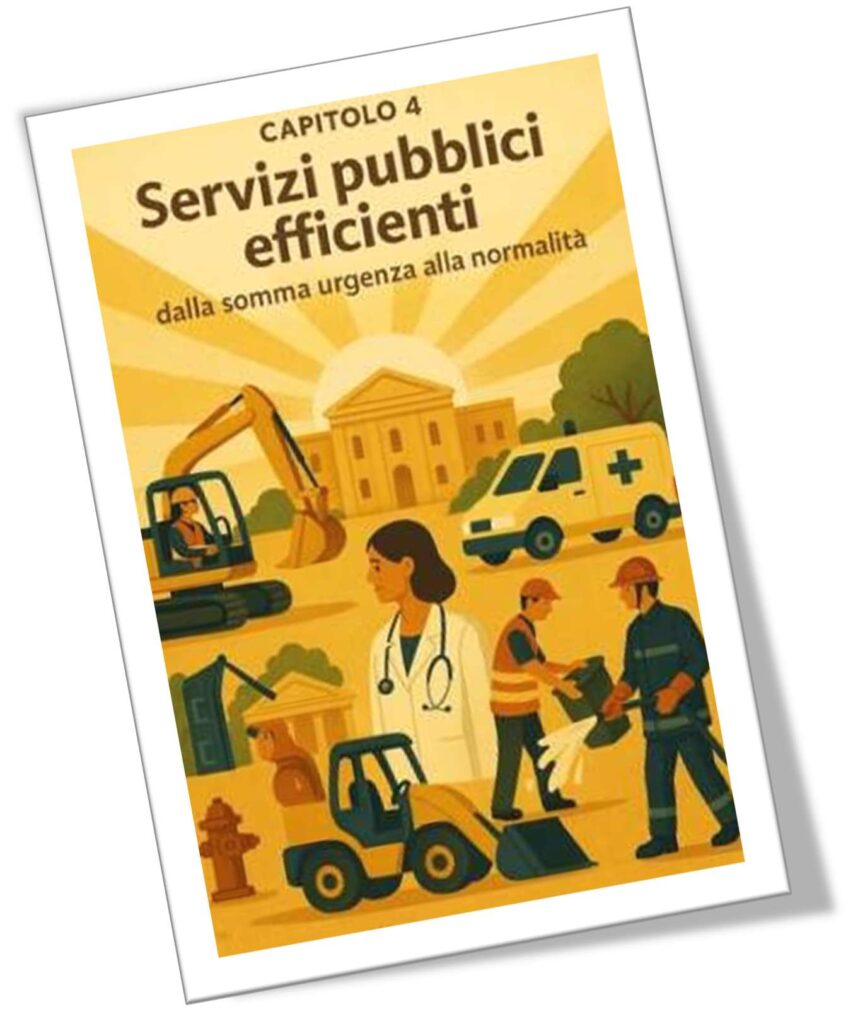
A city that looks to the future must be based on modern, efficient and continuous public services. Lighting, water service, street cleaning and maintenance: these are the elements
essentials that determine the quality of urban life.
Too many interventions in Marsala today are managed as a matter of urgency, without programming and without control.
This model generates delays, waste, poor quality in materials and outcomes. Most of all, it builds a system where businesses have an interest in "getting called on" more often, rather than getting things done.
Our proposal is a true administrative and cultural innovation: to entrust these services through medium- to long-term contracts, lasting 3 to 5 years.
These contracts will be built In the sole interest of the city, not to favor those who bid, but to ensure tangible and verifiable results. The clauses will be clear, binding, with certain and automatic penalties for non-compliance. No room for improvisation or approximation.
With this system, Marsala will be able to count on timely and certain interventions, carried out at the right time, without unnecessary delays.
Let's take an example: today, if a street lighting lamp fails, the company is called in on an emergency basis. To make a profit, it often installs the cheapest and least long-lasting lamp, so that it will return shortly for a new service. But if that company has a 5-year contract and a clause requiring replacement within 24 hours, then it will have convenience to install from
immediately the best available technology, because fewer failures mean lower costs and more gain for her.
The same principle should apply to beach cleaning. No more extraordinary and late interventions when the bathing season is already underway, But regular, planned, consistent service, entrusted on a multi-year basis, with clear obligations on timing and quality of intervention. Our coastlines are one of the city's most valuable resources, and must be treated as such: clean, cared for, safe, accessible, from early spring and throughout the season.
There is a change in logic: no longer working on the exception, but on the rule. Not on the breakdown, but on prevention. Not on the urgent, but on the normal.
This is also how a modern city is built: with firm rules, clear responsibilities, and contracts that protect the public good.
Marsala d
eve become a city for all, a city that leaves no one behind, that recognizes and respects diversity, that fights all forms of social, economic and cultural exclusion. A just city is not one that watches in silence, but one that Actively promotes inclusion and builds concrete tools to ensure equal opportunities for every person, regardless of economic, physical, cultural or age status.

Rights, dignity, inclusion
Our vision of social services is based on a very simple principle: no one has to feeling invisible. The poor, people with disabilities, the lonely elderly, minors at risk, families in difficulty, migrants: all must find in the municipality a serious, humane point of reference capable of listening and responding.
In this direction, we propose:
Removal of architectural barriers in all public spaces, not only to guarantee the right to mobility and independence for residents with disabilities, but also to make Marsala a city accessible to tourism for all, enhancing its historical and natural beauty from an inclusive perspective. Accessible tourism is an economic, cultural and civic opportunity.
Welcoming and inclusion of migrants, which represent a fundamental part of the productive fabric of our territory, especially in strategic sectors such as agriculture, construction and services. Marsala must be a welcoming city, capable of offering pathways to regularization, cultural mediation, Italian language learning, and access to health and housing. It is not only a human and legal duty: it is also a forward-looking choice
To build cohesion and development.
Concrete commitments:
A Marsala that puts "the last ones" at the center will be a Marsala that is stronger, more alive, more capable of facing the challenges of the future. A just community is one that is not afraid of differences, but recognizes them as a value.
Smart resource management: less cost, more cleanliness
The new system will allow A significant reduction in tariffs, by eliminating door-to-door costs in outlying areas and increasing recycling.
The staff engaged in collection today will be redeployed in an efficient and useful way for the community:

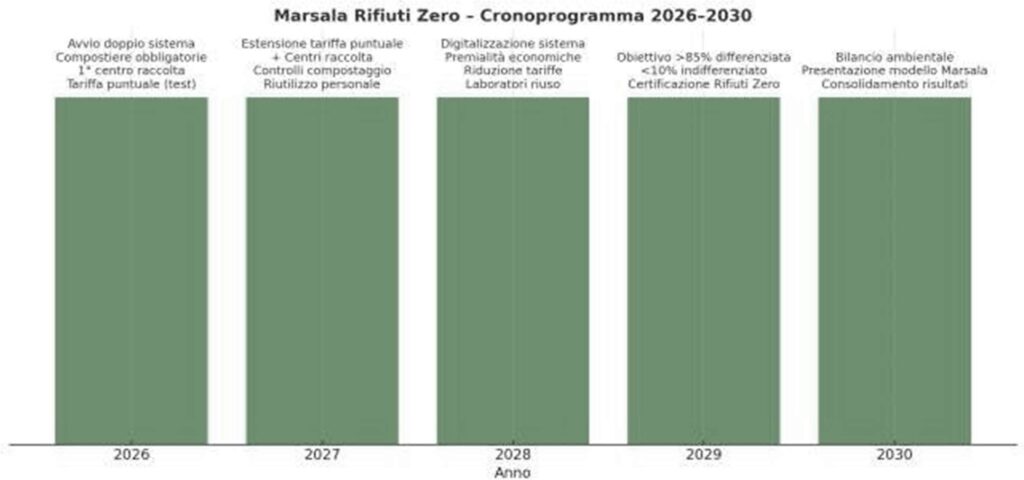
Education, transparency, accountability
Marsala Zero Waste 2030: It can be done
This reform is not only technical: it is cultural, economic, and social. It is a challenge that looks to the future seriously and realistically.
Marsala has the skills, resources and energy to become A Sicilian model of virtuous waste management. This transformation will be concrete, gradual and shared.
Marsala Zero Waste Chronotable (2026-2030)

CHAPTER 7: Marsala Autonomous Energy - Zero Emission Municipality by 2031. Marsala must become, in the next five years, an energy municipality. self-sufficient. A city capable of producing all the energy it consumes, drastically reducing dependence on fossil fuels, and becoming a virtuous model of ecological transition in the Mediterranean.
1. Target: 100% locally produced renewable energy.
The energy transition will be guided by an integrated plan that includes:
2. Energy efficiency of municipal facilities.
All public buildings will be upgraded with:
3. Electric mobility for the municipality and the citizenry.
Public and service mobility will become fully at zero impact:
4. Involvement and savings for citizens
5. A sustainable plan that pays for itself
Marsala's energy transition will be Fully funded through a 20-year plan
of investment, based on a simple principle:
Today the City of Marsala spends 100 on energy (public lighting, municipal buildings, waterworks, fuel for vehicles, etc.).
Tomorrow he will spend at most 80 per year for 20 years, allocating this amount no longer to consumption, but To investments in production and efficiency.
At the end of 20 years:
In summary:
Below is the summary chart of the "Marsala Autonomous Energy" energy plan:

Starting in 2046, Marsala will stop spending on public energy, enjoying
self-sufficiency and structural savings
Marsala Autonomous Energy Chronotable (2026-2030)
Year Main actions
2026 Consumption mapping
Tender for municipal energy plan
Public facilities design
Initiating first CERs
2027 Photovoltaic installation on all municipal buildings
Public lighting upgrading
Start purchasing electric vehicles
2028 Micro-wind and hydrogen systems
Columns in cities and districts
Activation 2nd ERC group
Conclusion means conversion
2029 Completion of aqueduct efficiency
+ Energy Communities
100% energy from renewable sources
2030 Municipal Energy Budget
Marsala model replicability startup
CHAPTER 8: Marsala, a place DI-VINO - agriculture at the center of new development
FOREWORD
Marsala must once again become a place OF WINE. A place where land is value, labor is culture, and wine becomes a language of identity. For too long agriculture has been treated as a residual sector. We think it is instead the beating heart of our history and our future.
The city must restart from its agricultural vocation, with a contemporary outlook: sustainability, innovation, cooperation, short supply chains, quality, rural tourism and landscape enhancement. And above all: people, skills, community.

Goals
Our actions
1. Marsala DI-VINO Plan.
A three-year program for the revitalization of agriculture, with:
2. Trademark "Marsala DI-VINO"
A territorial brand to tell the story of Marsala as an agricultural, welcoming and innovative city.
A distinctive sign to be used for products, events, routes, communication.
3. Marsala Wine Jazz Festival
A international event that combines wine with music, culture with the
conviviality, the territory to its creative soul. Every year in late summer, Marsala becomes the Mediterranean capital of wine and jazz, hosting:
4. Network of Wineries and New Agricultural Alliance
Building a united front between social wineries and private companies to emerge from the crisis, focus on quality and address markets, regulations and promotion together.
5. Permanent school of Mediterranean agriculture
An innovative training hub, in synergy with the Abele Damiani Agricultural Institute, to train young people and adults on new agriculture: sustainability, processing, marketing, agriculture 4.0.
6. Marsalese Earth Bank
Putting abandoned land back into circulation, allocating it to young farmers and innovative projects, including public-private partnerships.
7. The DI-VINO museum: widespread agricultural storytelling
A territorial circuit to tell the story of wine, vines and peasant work through authentic places, stories and testimonies.
Vision
Marsala can become a place DI-WINE not only for its wines, but for its ability to unite culture, identity, innovation and beauty. A city that bets on its agricultural landscape as a living heritage, on wine as a tool for storytelling and cohesion, and on its people-yesterday's, today's, and back again-as drivers of change.
CHAPTER 9: Marsala tourist city - doors open to the world, roots in the territory
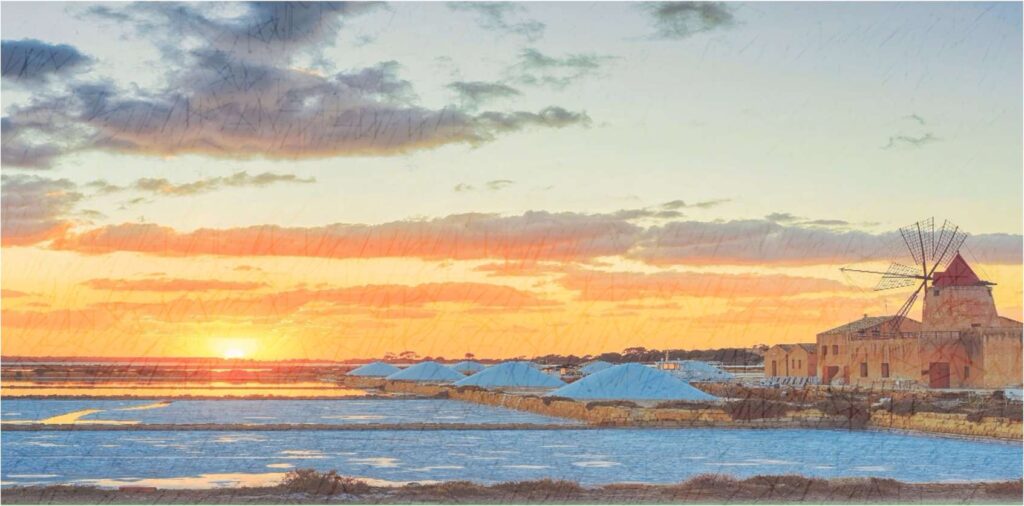
Marsala has everything to become one of the tourism capitals of western Sicily: a position strategic geography, a thousand-year-old historical heritage, breathtaking landscapes, a food and wine offering of excellence, and the unique competitive advantage of be a city that gives the name To one of the world's most celebrated wines. But all this is not enough if it is not supported by a modern vision, efficient infrastructure and Intelligent and integrated promotional policies.
A strategic airport for an international destination The first step is to restore centrality and visibility to the airport, turning it into the main door Western Sicily's tourist gateway.
We strongly propose a name change to:
Trapani/Marsala Airport
A choice that boosts the "Marsala" brand and makes the destination instantly recognizable globally.
This is accompanied by a concrete commitment to:
Marsala wine as an engine of territorial promotion
Marsala can and must Building its tourism image around its identity food and wine, leveraging the wine that bears its name and the area's entire heritage of PDO, PGI and organic products.
The European Union, through dedicated programs (EU Reg. 1144/2014), makes available. Funds to promote certified agri-food products. Integrated campaigns that unite can be funded:
Objective: to transform agricultural product into tourism product, with impact on economy, labor and territorial reputation.
Operational synergies for revitalization
1. Creation of a steering committee between the municipality, Marsala Wine Consortium, producers, tour operators, cultural bodies
2. Design and application to community calls for proposals For joint promotion campaigns abroad
3. Development of wine tourism routes, wine museums, tours of wineries and historic vineyards
4. Digital platforms for territorial promotion With multilingual content, bookable experiences, storytelling of the area
5. Twinning and cooperation with other European wine cities To attract new flows and create cultural networks.
Toward an integrated model of sustainable tourism
The tourism we envision for Marsala is:
Accessible, including for people with disabilities and special needs
Cozy, including for migrants who contribute to our economy
Centered on authentic identities, not artificial but rooted in history and landscape
International, but with direct benefits on local communities
Marsala has all the credentials to become a The Mediterranean capital of wine, experiential tourism and cultural landscape.
We want to bet on this vision. With method, investment, collaboration and pride
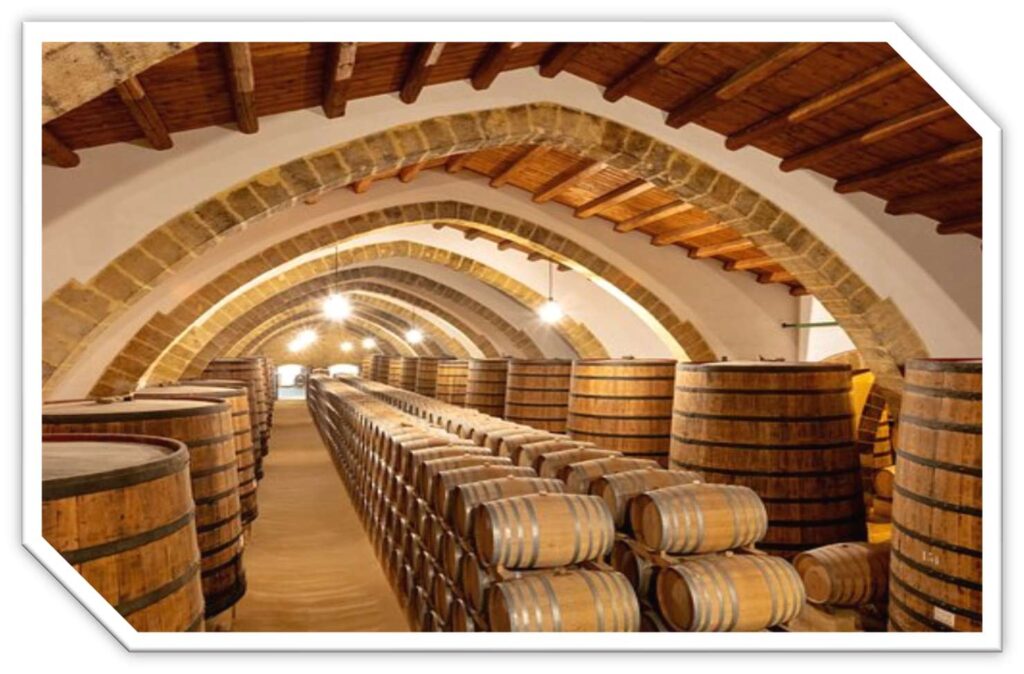
CHAPTER 10: Marsala is thirsty - a strategic plan for water, a common good and vital resource
Marsala is facing a silent but devastating water crisis. The aquifers are drying up due to overexploitation and the absence of protection and recharge policies. Agriculture - the backbone of our economy - is suffering from the lack of water in an area that by vocation should be fertile and productive. We can no longer limit ourselves to the emergency. We need a long-term vision based on sustainability, innovation and autonomy.
Priority objectives
1. Preserve existing aquifers
2. Construction of a desalination plant for drinking water.
3. Reuse of purified wastewater for irrigation.
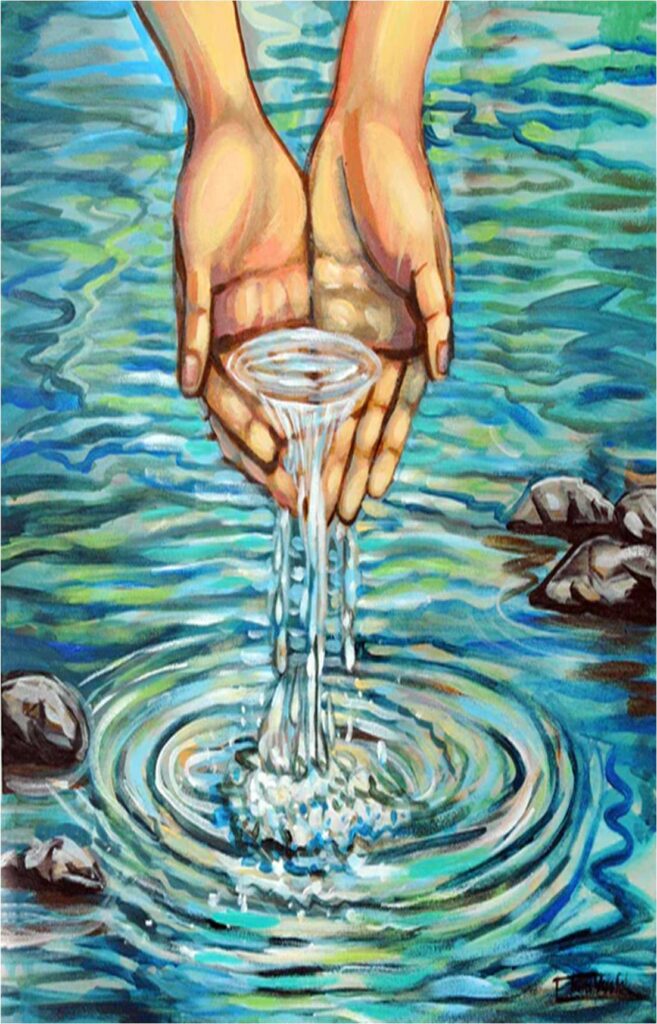
Governance and innovation
A new pact between city and territory
Water means life. Water means agriculture, food, jobs, dignity. Marsala needs a new pact with the territory, which focuses on the management responsible and forward-looking water resources. With this plan, we want to Addressing thirst with concrete solutions, to ensure access to clean water as a right for all today and tomorrow.
CHAPTER 11: Associationism and the enhancement of social and sports containers.
Marsala is a vibrant community rich in civic energy, which finds expression in cultural, social, sports and volunteer associations. We believe that support and enhance associationism is key to building a cohesive, inclusive and participatory city. ' Enhancement and support for associationism.

Use and regeneration of social and sports containers
Specific actions for key sectors Volunteerism
social
Youth sports
Cultural promotion
Toward a stronger and more participatory community
Marsala must become a city that listens to, involves and enhances associational energies present in the area, making social and sports spaces places of inclusion, growth and active participation.
With this approach, we intend to strengthen the social fabric and build a more supportive and vibrant future together.
CHAPTER 12: Cultural Container Management - Toward a Foundation for Marsala.
Marsala is rich in important cultural containers that represent a unique heritage for the city and the whole territory. Prominent among them are the Empire Theater, the Municipal Theater, the Complex of St. Peter's, the Carmel Monastery, Fici Palace e Grignani Palace. In order to make the most of these spaces, ensure efficient and qualified management, and revitalize the city's cultural offerings, we intend to Establish an ad hoc foundation dedicated to their managerial management.
Why a Foundation?

Integrated planning and memoranda of understanding
The Foundation will also be responsible for Enter into memoranda of understanding with the Archaeological Park of Lilybaeum, with the Management Authority of the Stagnone Islands Reserve and with all the committees organizers of the city's religious-cultural activities.
These understandings are critical to:
Foundation Goals
With the Foundation, Marsala equips itself with a modern instrument capable of creating a system around its cultural heritage, transforming it into a driving force for social, cultural and economic development.
CHAPTER 13: Ensuring a safe,serene environment for every citizen of Marsala
Therefore, we propose a strategic plan that involves all institutional and voluntary entities, creating an integrated and efficient security system. Establishment of a Multidisciplinary Steering Committee.
- Composed of representatives from:
- Law enforcement agencies (Police, Carabinieri)
- Civil Defense
- Fire Department
- Service 118/Ambulances
- Civil defense volunteer associations
- School and administrative representatives
- Functions: planning, management of
emergencies, coordination of interventions,
continuous monitoring.

1. Security in the Historic Center and Suburbs.
- Strengthen the presence of law enforcement:
Increase night and mobile patrols in the most critical areas.
- Installation of video surveillance cameras; upgrading the security system with updated cameras and active monitoring.
- Improved public lighting: increase lighting in outlying areas and less well-lit streets in the historic center and suburbs. - Prevention programs: collaboration with associations and volunteers in the area to encourage neighborhood and awareness initiatives.
2. Attention to Youth and Saturday Night Problems.
- Safe transportation: provide free or low-cost buses during busy evenings, especially on Saturday nights, to reduce the risks associated with uncontrolled nightlife.
- Positive gathering spaces: create and promote clubs, youth centers and equipped areas for safe entertainment.
- Entertainment programs: organize weekend events, concerts, and cultural events to provide healthy and engaging alternatives.
- Security during nightlife: presence of stewards and security personnel at public events, and awareness campaigns among young people.
3. Innovative Ideas
- Digital safety platform: application or website where citizens can report dangerous situations in real time.
- Mobile intervention units: teams of volunteers or neighborhood police who can intervene quickly in case of problems.
- Collaborations with schools and youth associations: educational programs on respect for rules and civil coexistence.
4. Creation of a Multidisciplinary Steering Committee.
- Establish a permanent steering committee composed of representatives from law enforcement, Civil Defense, fire brigade, 118, voluntary associations, educational institutions, and municipal governments.
- This control room will be responsible for planning, coordinating and monitoring all emergency prevention, intervention and management activities in the territory.
5. Cooperation and Synergy among the Forces.

- Strengthen cooperation between Law Enforcement, Fire Department, Civil Defense, Ambulances and the Volunteer Associations.
- Promote joint exercises and simulations of natural disasters and emergency situations to ensure rapid and effective response.
6. Training and Awareness Raising of Youth and Citizens.
- Organize training courses and workshops on natural hazard prevention, first aid techniques, and behaviors to be adopted in case of emergency.
- Involve schools, youth associations and citizens in civic education programs on safety, developing civil defense volunteer figures among young people.
7. Planning and Implementation of Preventive Interventions.
- Strengthen hazard mitigation infrastructure such as planned warning systems for natural disasters (school and city alarms), improve escape routes and emergency areas.
- Install environmental monitoring and early warning systems for events such as floods, earthquakes and fires.
Advance planning and warning systems
- Enhancement of environmental monitoring infrastructure.
- Implementation of early warning systems and emergency communications.
- Identifying and securing sensitive areas
8. Effective and Coordinated Response
- Activate immediate and coordinated response systems through the control room, ensuring rapid and organized intervention in every area of the city.
- Constantly convey clear and effective information to citizens through official channels and social media.
9.Implementation of practical exercises
- Simulations of natural disasters (floods, earthquakes, fires) to be carried out periodically in the area.
- Joint exercises among all forces involved to test and improve intervention procedures
- Identification and securing of sensitive areas.
The safety of the Marsala community requires a comprehensive and synergistic approach, capable of involving all institutional entities, associations and the citizens themselves. It is essential to prepare a plan that promotes prevention, rapid intervention and awareness throughout the entire municipal territory.
CHAPTER 14: Program for the Development and Management of Parking and Connecting Infrastructure Municipality Marsala
Overall goal
Improve accessibility, sustainable mobility, and quality of life for the community by planning new parking lots, efficiently connecting suburban areas to the urban center, and integrating innovative services.
1. Analysis and evaluation of current areas
- Mapping of existing areas: identification of current parking lots, parking zones and connecting routes Traffic analysis: monitoring of areas with congestion, assessment of parking demand.
- Identification of critical issues: limited accessibility, lack of parking spaces in outlying areas.
2. Identification of new parking areas.
- Search for areas to be enhanced:
- Unused or underutilized public spaces.
- Green areas easily converted into temporary or permanent parking spaces.
- Design of new parking lots:
- Multi-storey or underground parking lots in strategic areas.
- Eco-sustainable solutions with solar panels and integrated green zones.
- Environmental and social impact assessment.
- Community involvement to gather feedback on proposed new areas.
3. Improved connections to the center and services
- Pedestrian and bicycle routes:
- Creation of safe bicycle lanes and pedestrian paths well
maintained.
- Installation of effective signage and lighting.
- Public transportation:
- Enhancement of bus routes and electric vehicles.
- Direct connections between outlying areas, parking lots, and points of
interest.
- Shared transportation services and shuttles:
- Introduction of free or low-cost shuttles and shuttles for residents.
- Digital platforms for booking and route planning.


4. Innovative parking technology and management
- Real-time monitoring system:
- Sensors and cameras to constantly update availability.
- Mobile app to find free parking spaces, reserve and pay.
- Automated payment systems:
- NFC, QR code and other contactless modes.
- Data Analytics:
- Data collection to optimize management and plan future expansions.
5. Budget, funding and timelines
- Estimated budget: details of infrastructure costs, technology, works.
- Sources of funding:
- public, European, private funds and public-private partnerships.
- Timeline of implementation:
- Design, testing and start-up phases
6. Community involvement and communication
- Workshops and public meetings: gathering feedback and raising awareness.
- Information campaigns: promoting sustainable mobility patterns.
- Supervisory Committee: monitor results and propose improvements.
Conclusions
The goal is to create an integrated, sustainable and innovative mobility system that enhances suburban areas and makes the city center more attractive and accessible, while respecting the environment and the needs of citizens.
CHAPTER 15: Political Program for the Historic Center of Marsala.
1. General Objective:
Enhance the historic center of Marsala as a cultural and social heart, promoting initiatives that respect and enhance its history, culture, religiosity and craft traditions, creating a welcoming, decorous and identity-rich environment Key Points and Initiatives
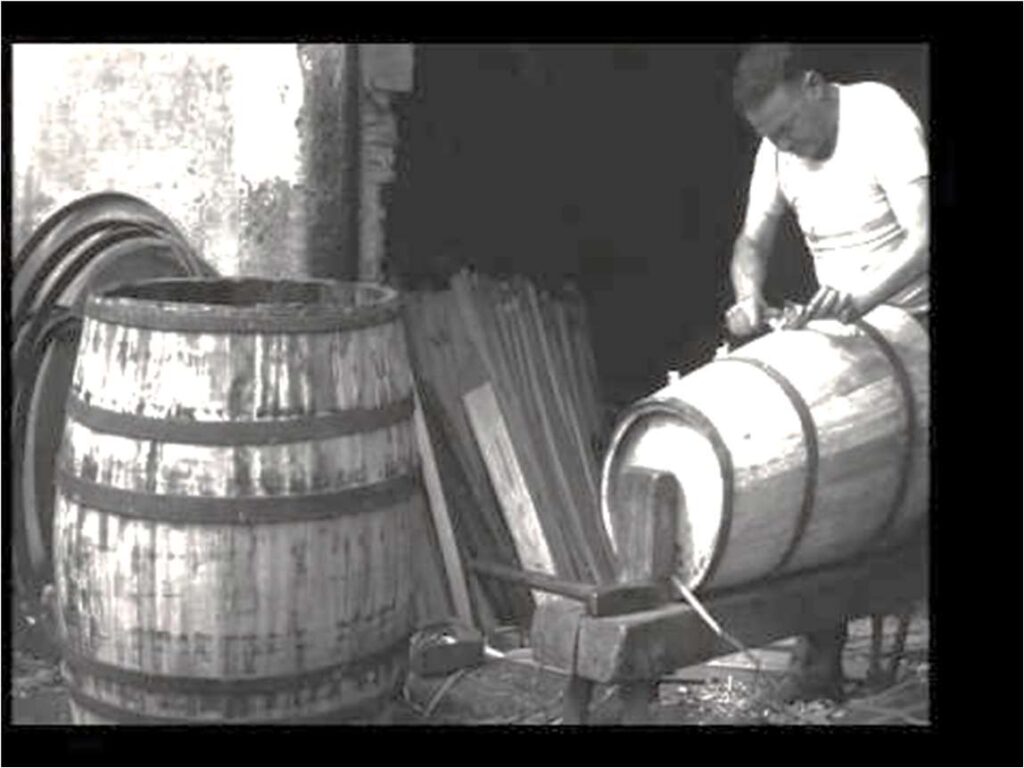
A. Street Furniture and Public Art
- Colored Umbrellas: Installation of umbrellas of various colors and sizes along the main streets, creating a lively and inviting visual effect related to Marsala's maritime and wine-making traditions.
- Embellished Balconies and Facades: Program to encourage the decoration of balconies and facades, with support for initiatives by local artists or associations, respecting the history and architecture of downtown.
B. Promotion of Craft and Commercial Traditions.
- Historically Themed Shops: Support for stores that tell the story of Marsala, such as artisans who worked the wine barrels, with decorations and displays of traditional tools.
- Artisan Markets and Shops: Creation of corners dedicated to local artisans, where visitors can see production processes and buy authentic products, enhancing traditional crafts.
C. Respect for and Enhancement of Religious Riches.
- Events and Exhibitions in Historic Churches: Organizing cultural and religious events, respecting the sacredness of the places, to promote the religious and social history of Marsala.
- Signage and Information: Installation of information panels in streets and squares, telling the story of churches and monuments, using multimedia aids.
D. Cultural and Social Initiatives
- Festivals and Events: Development of annual events, such as wine, culture and craft festivals, with performances and conferences that engage the local community.
- Workshops and Education: Educational programs in schools and workshops open to the public, promoting the traditions and history of Marsala.
E. Sustainability and Social Respect
- Regulation of Public Spaces: Policies on urban decorum and regulation of commercial activities, encouraging stores that are decent and respectful of historical and cultural identity.
- Community Involvement: Creation of discussion boards among citizens, merchants, historians, and clergy to develop shared and sustainable initiatives.
Turning the historic center into an outdoor shopping mall
1. Markets and cultural events: organize weekly markets, local craft fairs, and cultural events to attract visitors and create a lively atmosphere.
2. Socialization spaces: create seating areas with benches, outdoor tables and children's games, encouraging residents and visitors to meet.
3. Art installations: include temporary or permanent artworks to beautify the streets and offer a unique and attractive appearance.
4. Incentivize sustainable mobility: provide public bicycles, electric vehicle charging stations, and wide and well-maintained pedestrian paths.
5. Special offers and promotions: involve local stores and restaurants to create discounts and special offers, incentivizing shopping and visiting.
Conclusions
This program aims to make the historic center of Marsala a living place, respectful of its identity and attractive to both residents and visitors, contributing to the economic, cultural and social revitalization of the city. Collaboration between institutions, citizens and entrepreneurs will be crucial to the success of these initiatives.
